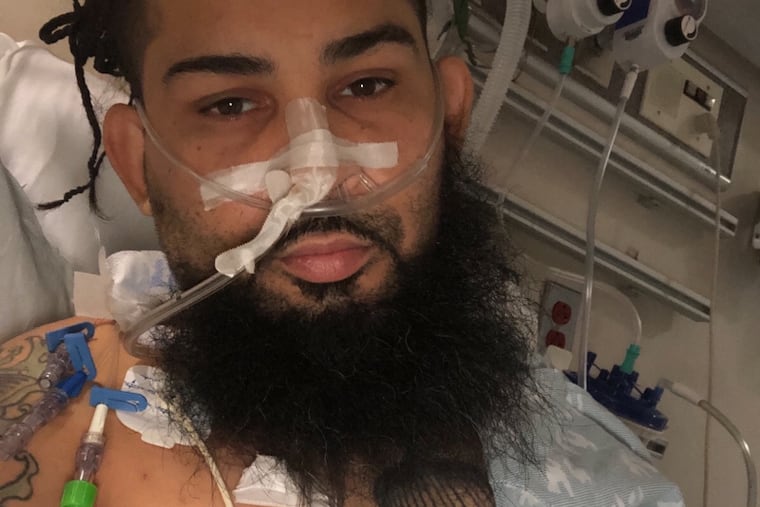‘A letter to the people who shot me’ | Helen Ubiñas
Luis Berrios tries not to drown in a depression of whys, what ifs and what will be. Instead, he drafts the words to the men who cared little about whether he lived or died.

A letter to the people who shot me…
The words had been rattling in Luis Berrios' head almost as soon as he woke up from being shot in the back during an attempted robbery.
First, he checked to see if he could still walk. And when he found that he, thankfully, miraculously, could, the words started to form.
I’m not mad, I’m not angry. I’m not looking for vengeance. I’m not looking for you at all. I’m sad, I’m sad that you shot me and that you hurt me.
The bullet left a scar on his back no bigger than a bad bug bite, but two bags protruding from his stomach show the real damage, to his pancreas, his kidney, his intestines. The bullet is still lodged near his right lung.
Berrios and a friend were coming home from the Eagles game in the early hours of Nov. 12, their team having lost to the Cowboys. But for them it was still a good night. They stopped at a neighborhood gas station, and then a Chinese restaurant in his Hunting Park neighborhood before heading to Berrios’ house nearby.
His friend walked in front of him, talking to someone on the phone. A big church van blocked the streetlight that usually lit up the area. He climbed the step to his door.
He felt the guys behind him before he saw them. “You already know what this is,” they told him.
If you would have talked to me, I would have helped you. That’s who I am.
He knows what it’s like to be without, to do what you think you have to do to survive. Things that put you and others in danger.
But that was well behind the 35-year-old. He’d gone to Philadelphia Technician Training Institute to learn welding and after graduation, started working there to place guys who had lost their way into a trade. He knew them. He’d been one of them.
If he had been shot before he made the change, it wouldn’t have been a surprise. Part of living the life. But he could feel his world moving in the right direction. "My life was on the rise.”
And then he felt the bullet as he tried to get away. His friend ran when he heard the gunshots. The men ran off, too, with nothing. Berrios dropped to his knees, feeling the cold from the pavement, and dialed 911.
“Please come and get me. Don’t let me die,” he told the operator before he passed out.
He came to long enough to know the officers were putting him in their cruiser. And then again at Temple Hospital, where he saw the fear in his mother’s eyes before closing his again.
It took a week for Berrios to fully grasp what happened to him.
Now he lies in his metal hospital bed, more than a month later, scooping ice chips into his mouth, the only thing he’s been allowed to eat since he was shot, to wet his lips and make it easier to talk. His voice is new to him after the removal of a breathing tube. A strange, raspy whisper. A lot of the tubes that doctors inserted into his chest and abdomen are slowly being removed, but he’ll go home with a colostomy bag.
You don’t know the damage that you’ve caused me. You’ve changed my whole life for absolutely nothing.
He’s started the letter countless times. Started it, then balled it up, then started it again. Who knows if he’ll ever get to give it to them; they disappeared into the night.
His coworkers visit, his friends and family drop by, but he’s worried about life after. He won’t be able to work for a while. He hasn’t been told when he’ll be released, but already he has a plan: Go home, lock himself in, don’t answer the door after a certain hour, cameras everywhere.
His mother arrived from Florida and stayed for a while, but she had to go back home. His sister from Washington came, too.
He works on his letter and tries not to drown in a depression of whys, what ifs, and what will be. Instead, as he drafts the words to the men who cared little about whether Berrios lived or died, he is rooted in an emotion few of us could muster after being shot in the back, an emotion forged in the desperation he knew in a life he left behind.
I forgive you. I hope one day you can forgive yourself for what you’ve done to me.